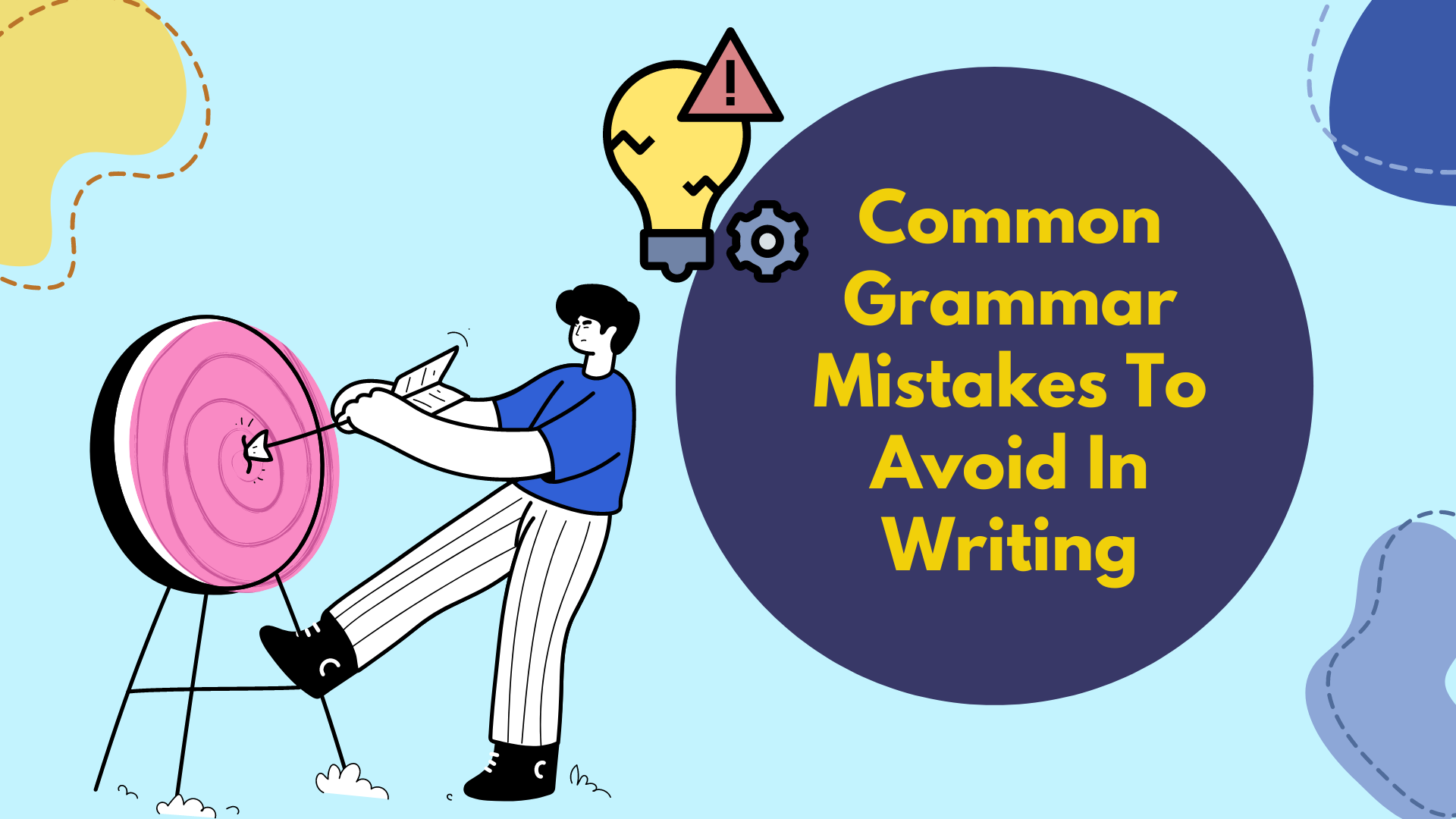Having a good grasp of grammar is an essential quality of a good writer. However, even the most trained writers and content creators often end up making grave grammar mistakes.
Grammatical errors can slip by easily, especially when you are editing the content yourself. They can pull down the quality of your content and leave your readers confused about the meaning of your message. This fact can be corroborated by a study done in the UK on the impact of grammatical errors on people’s purchase decisions. It was found in the study that almost 59% of the people felt that they would refrain from buying products from a website with bad spelling and common grammatical errors. They believed that bad grammar made it difficult to trust the quality of the company’s services.
Re-learning the basics of grammar can help you write better and deliver high-quality content that converts. Most brands will usually have a content style guide that puts proper grammar and mechanics right at top priority, making it all the more crucial.
In this article, we’ll take you through some common grammatical errors which can affect the credibility of your content. But before we get to that, we’ll take a look at what is meant by grammatical errors, and how you can identify them in your content.
10 Common Grammatical Mistakes
- There, Their and They’re
- You’re and Your
- Passive Voice
- Dangling Modifiers
- Incomplete Comparisons
- Apostrophe Usage
- Effect and Affect
- Too and to
- Referring to a brand or entity as ‘they’
- Pronoun Disagreement

What is a Grammatical Error?
A grammatical error is also known as a usage error. It essentially refers to unconventional or faulty usage of a word or phrase. When a sentence is constructed with imprecise use of normative rules, it can result in grammatical errors.
Sometimes words or phrases might sound perfectly fine in your head but when you write them down, the meaning of the sentence gets diluted. These common grammatical errors can be identified with the help of grammar checker tools, which can help you in fixing improper word usage, punctuation, and verb tense, among other things.
Without further ado, let’s explore some common grammatical errors you should avoid.
TL;DR Here’s a short video running you through the 10 common grammar mistakes to avoid.
10 Common Grammatical Mistakes
1. There, Their and They’re
Even the most seasoned content writers often end up making mistakes with these three words. So here are the rules for using these homophones –
- There refers to a place that is not here. For example, “Over there”.
- Their is used for something owned by a group. It shows that something belongs to a person.
- They’re is a contraction of two words – they and are.
Remember the difference between the three and always make sure to check a few times so that you know you’re using the right word in the right place.
Example: Their food is outstanding – They’re going to like it – There you go!
2. You’re and Your
This is another set of homophones that are commonly misused in writing. Using one in place of the other can affect the quality of your content. Here are the rules for using these two words –
You’re is a contraction of two words – you and are.
Your is a possessive adjective that indicates ownership of something. It defines something that belongs to ‘you’.
If you have trouble with the usage of you’re and your, it is always a good idea to run an English grammar check.
Example: How is your day going? – You’re fast as lightning!
3. Passive Voice
Using passive voice is a common mistake many writers make. The problem with using passive voice is that it makes your content sound weak and unclear. Passive voice occurs when the object of a sentence is placed in the beginning rather than the end. Usually, the object is placed at the end of the sentence, after a verb.
With a passive voice, the noun ends up receiving the action. This makes the sentence sound clunky and vague. It is always better to use an active voice to get the attention of the reader. Active voice also makes your writing more alive and clear.
Example: Matt is cooking dinner (active voice) – Dinner is being cooked by Matt (passive voice)
4. Dangling Modifiers
This is another common English grammar mistake made by content creators when writing introductory phrases. A dangling modifier usually happens when the modifier’s intended subject is missing from the sentence. It can be easily identified when a descriptive phrase does not apply to the noun that comes after it. To put it in simple terms, a dangling modifier is a word or phrase that modifies something that has not been stated clearly in the sentence.
Example: ‘Having finished the paper, the TV was turned on.’ – In this sentence the doer has not been stated, which makes the participial phrase “having finished” a dangling modifier.
The correct way to write this sentence would be – ‘Having finished the paper, Rebecca turned on the TV’.

5. Incomplete Comparisons
The grammar mistake of incomplete comparisons often escapes most writers. Although it doesn’t seem like a prominent mistake, it can greatly affect the quality and readability of a sentence.
For instance, when you write a sentence like – ‘Our model is faster and more advanced’. Although it doesn’t sound wrong at first look, it will leave the reader confused about what the model is being compared to.
To convey the full meaning of the sentence, it’s important to clarify what the object is being compared to.
Example: That car is faster (incorrect) – That car is faster than mine (correct)
6. Apostrophe Usage
A common problem that occurs with possessive nouns is the usage of apostrophes. Even skilled content writers may sometimes have trouble identifying the right place to add the apostrophe. Here are some general rules for using possessive nouns with apostrophes in sentences –
- When the noun is plural, remember to add the apostrophe after the ‘s’.
- When the noun is singular, but it ends with an s, the apostrophe will again be added after the ‘s’.
- When the noun is singular and does not end with an ‘s’, you can add the apostrophe before the ‘s’.
Example: That family’s sheep have gone missing – The girls’ dresses are beautiful – That dress’ fitting is exceptional
Apostrophes are also used with common contractions like can’t, doesn’t, aren’t, they’ll, they’re, and couldn’t, among others.
7. Effect and Affect
Most writers end up confusing these two terms when mentioning how something changes the other. Here is the rule for using these two words in your sentences –
- Affect is used when you are writing about the act of changing.
- Effect is used when you are writing about the change itself.
Example: That music had a profound effect on me – That music affected me profoundly.
8. Too and to
This grammatical error is almost always the result of an accident. Most writers are familiar with the differences between to and too, but often end up writing one in place of the other. For the sake of clarity, we will take a look at the rules of usage for these words –
- To is added before a verb or a noun when you need to describe an action, recipient, or destination.
- Too is used to describe an adjective in extreme terms. It is used in the place of ‘as well’ and ‘also’.
Example: I’m going to get a pizza – Would you like some pizza too?
9. Referring to a brand or entity as ‘they’
This is a common grammar mistake that many writers are not familiar with. We will explain why you should never refer to a brand or entity as ‘they’, so you don’t end up making this mistake with your copywriting content. When you are writing about a business in your content, it would be wise to remember that it is not plural. So the right way to write about a business would be by using ‘it’ rather than ‘they’. Although it takes some getting used to, with practice you will be able to catch yourself before committing this common mistake.
Example: Dunkin Donuts changed their branding (incorrect) – Dunkin Donuts changed its branding (correct)
10. Pronoun Disagreement
This is another common mistake made by content creators when writing sentences with singular and plural nouns. You can easily avoid this grammatical error by following a simple rule of –
- Using singular pronouns for sentences with singular nouns.
- Using plural pronouns for sentences with plural nouns.
Example: Every girl’s dream is to be successful when they grow up. (incorrect) ; Every girl’s dream is to be successful when she grows up (correct).
Conclusion
With the knowledge of these 10 common grammar mistakes, you now know how to avoid them and write better content with proper grammar. Grammatical errors are bound to crop up from time to time, but the key lies in catching the content mistakes before the content gets published. You can keep your grammatical mistakes in check by –
- Avoiding writing too fast: When you write your content too fast, you can end up making typographical errors (or typos). This is because our minds run significantly faster than our hands that are typing/writing.
- Reading aloud to yourself: Whenever you are having trouble with any parts of the content, read it aloud to yourself and listen carefully. Your instinct will tell you that a particular sentence does not sound right. You can also cross-check the sentence online.
- Avoiding spelling errors: When you are unsure, always do a quick check with a grammar checker.





